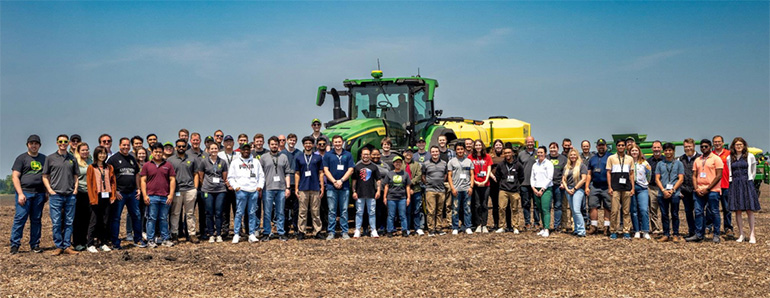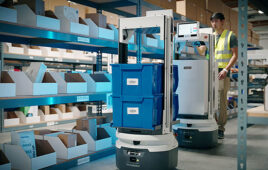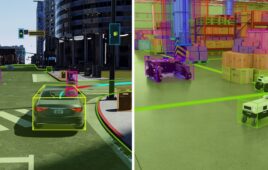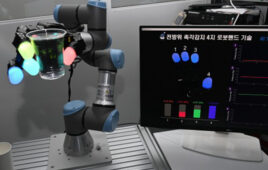|
Listen to this article
|

The 2023 CyberTractor Challenge included a large number of participants. | Credit: CyberTractor Challenge
This week, top tractor manufacturers in the United States, including John Deere, CNHI, and AGCO, will hold the annual CyberTractor Challenge. This event encourages college students to try to breach the security of both the firms’ cloud-based solutions and physical hardware such as tractors, smart tools, and different IoT devices.
The CyberTractor Challenge is a five-day event aimed at students passionate about cybersecurity. It provides a platform for practical experience and professional guidance. During the event, industry experts emphasize the importance of diversity, hands-on experience, and professional mentorship. They also highlight the convergence of technology and agriculture, underlining the need for professionals with expertise in both fields. This event addresses the significant shortage of cyber talent and showcases the potential synergy between cybersecurity and agriculture, given the complexity of modern agricultural equipment.
Earlier this year, John Deere announced a new partnership with SpaceX and Starlink to bring high-speed internet to rural areas around the world to help connect all of the various smart devices on the modern farm to the cloud.
CyberTractor Challenge expands beyond John Deere
John Deere started the CyberTractor Challenge in 2022 as a sister event to the more well-known CyberTruck and CyberAuto challenges. College and university students gather on a real farm in Iowa to work with real equipment and real cybersecurity and engineering professionals. As the idea for CyberTractor grew, the challenge’s goals and scope changed from just focusing on the famous green and yellow tools to including peers from the industry. CyberTractor Challenge is now a 501(c)(3) non-profit organization and aims to enhance the overall security of the agtech industry.
“Industry experts, professors, and tractor company employees will be guiding them every step of the way,” said Ethan Luebbering, director of recruiting for the CyberTractor Challenge. “Our plan is to prepare them with all the skills and tools they need to be effective during the event and all of the experiences required to start a career in Cyber Security.”
The primary goals of the CyberTractor Challenge are:
- Educating students about cybersecurity in the agriculture industry through hands-on learning and expert training.
- Attracting and developing the next generation of cybersecurity talent for the agriculture industry.
- Fostering collaboration between universities and agriculture companies on cybersecurity issues.
- Identifying potential vulnerabilities in agricultural equipment and systems through a hackathon-style event.
Throughout the event, students gain knowledge in embedded software engineering and protocols like CANbus used in modern agricultural equipment. Working with industry professionals from the tractor companies, students learn cybersecurity topics such as penetration testing and red teaming techniques for finding vulnerabilities.
Many modern tractors and smart implements could be considered robots, sitting at the intersection of technology and agriculture. This weeklong hackathon provides the students with real-life, hands-on skills for identifying potential bugs or vulnerabilities. The companies benefit by identifying any vulnerabilities in a controlled environment, and farmers benefit because the agtech solutions are hardened against nefarious vulnerabilities.
The event attracts students from universities across the country with interests in fields such as electrical engineering, computer science, and cybersecurity. The organizers also recruit professors from partner universities who teach cybersecurity courses and help educate the students. Participating institutions include Iowa State, Colorado State, and Dakota State University. Employees from the sponsoring agriculture companies conduct educational sessions, interact with the students, and evaluate any findings.
A weeklong hackathon
The week-long event kicks off with two days of educational sessions where industry experts and hackers teach students about embedded systems, protocols, and penetration testing techniques. Over the next two days, students apply their knowledge to develop hypotheses and test for potential vulnerabilities in the equipment in a hackathon-style setting. On the final day, students present any bugs or vulnerabilities they have discovered to the sponsoring companies.
Key outcomes of the CyberTractor Challenge include:
- Identifying potential vulnerabilities in agricultural equipment cybersecurity.
- Attracting and developing top cybersecurity talent for the agriculture industry by exposing students to career opportunities.
- Fostering collaboration and information sharing between universities and agriculture companies on cybersecurity best practices.
- Advancing cybersecurity standards and regulations for the agriculture industry through discussions among participating organizations.
- Building awareness of the importance of cybersecurity in agriculture and attracting diverse talent beyond traditional IT fields.
- Providing hands-on, experiential learning for students that complements their academic studies.
Catch up with the latest in agricultural autonomy on The Robot Report Podcast. Chris Padwick discusses John Deere’s use of machine vision and AI in episode 149, and Marc Kermisch from CNHI talks about digitization and autonomy in agriculture on episode 138.







Tell Us What You Think!